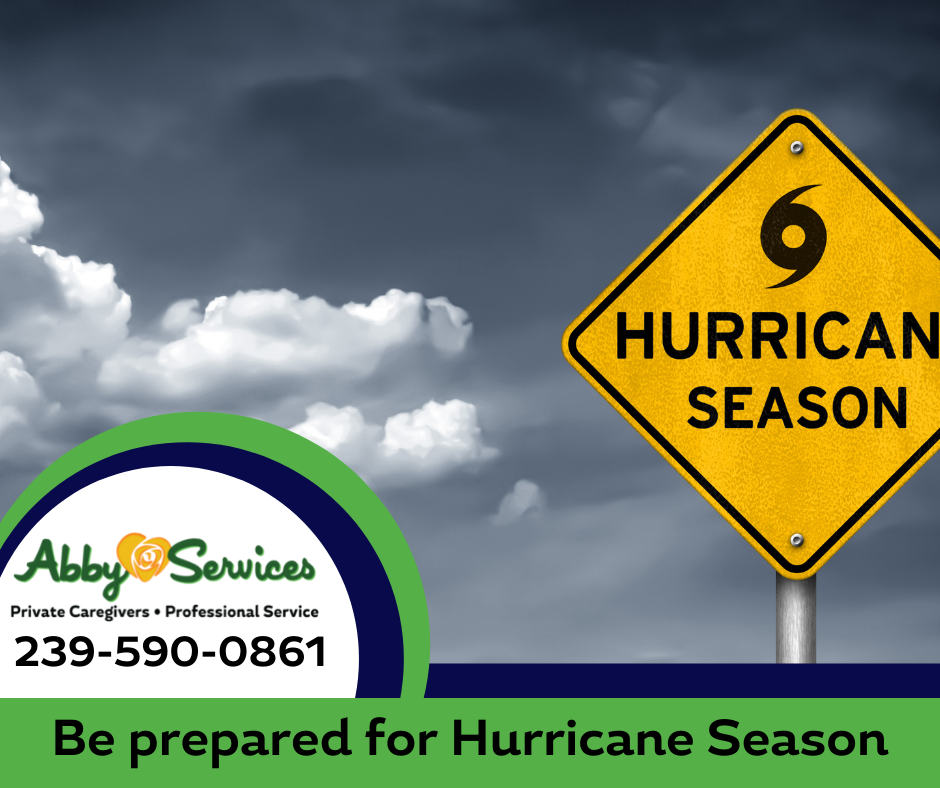Are you ready for the next big storm?
Emergency planning can easily be put off or forgotten about. Emergency planning for seniors is especially important in Fort Myers and Cape Coral where we are prone to hurricanes annually.
In Southwest Florida we have seen our fair share of severe storms. The threat of this natural disaster is one that Abby Services encourages all elderly homebound patients to take seriously. Advance preparation can be the key to comfort and survival. That is why emergency planning for seniors is so important.
How is emergency planning for seniors any different than everyone else?
Seniors may have access to limited resources or have a limited ability to access available resources. Seniors also may rely on outside services such as Abby Services to remain safe and independent in their homes and cannot remain independent otherwise.
In the event of an emergency, Abby Services does all we can to maintain consistent service provided by in-home caregivers. Unfortunately, there may be times where circumstances are out of our control and a caregiver may be delayed or unavailable. That is why we encourage clients requiring care during a potential emergency to make plans to evacuate to a local shelter with around-the-clock care before, during, and after an expected emergency.
The American Red Cross has a special publication specifically designed for seniors to help them prepare for a disaster.
Senior emergency planning Fort Myers , Cape Coral,. and Southwest Florida.
A key consideration in some senior’s emergency planning is special needs sheltering. Clients requiring special needs provisions are encouraged to register with Special Needs Shelters well in advance.
Should clients require any assistance registering with special needs shelters we are here to help. Our nurse, Scott Strachan has the experience and training to help families develop a care plan that includes senior emergency planning, even special needs registration and sheltering.
Each county we serve does have annual publications available to help with your emergency planning. Links to those resources are included below.
County special needs information.
County All Hazards Guides:
The Agency for Healthcare Administration maintains this site which links to valuable emergency preparedness resources as well.
The Agency for Healthcare Administration requires all Home Health providers to provide clients with specific information which we are including for your convenience below:
APPENDIX B: INFORMATION FOR NURSE REGISTRY PATIENTS
Please note: The special needs shelter should be used as a place of last refuge. The evacuee may not receive the same level of care received from independent contractors in the home, and the conditions in a shelter might be stressful.
(1) If the patient has a caregiver[1], the caregiver must accompany the patient and must remain with the patient at the special needs shelter.
(2) The following is a list of what special needs patients need to bring with them to the special needs shelter during an evacuation:
- Bedsheets, blankets, pillow, folding lawn chair, air mattress
- The patient’s medication including the dose, frequency, route, time of day, and any special considerations for administration, supplies, and equipment list, including the phone, beeper, and emergency numbers for the patient’s physician, pharmacy and, if applicable, oxygen supplier; supplies and medical equipment for the patient’s care; Do Not Resuscitate (DNRO) form, if applicable;
- Name and phone number of the patient’s nurse registry
- Prescription and non-prescription medication are needed for at least 5 to 7 days; oxygen for 5 to 7 days if needed.
- A copy of the patient’s plan of care, if applicable
- Identification and current address
- Special diet items, non-perishable food for 5 to 7 days, and 1 gallon of water per person per day
- Glasses, hearing aids and batteries, prosthetics, and any other assistive devices
- Personal hygiene items for 5 to 7 days
- Extra clothing for 5 to 7 days
- Flashlight and batteries
- Self-entertainment and recreation items, like books, magazines, quiet games.
(3) Shelterees need to know the following:
- If the patient has a caregiver, the caregiver(s) shall be allowed to shelter together in the special needs shelter. If the person with special needs is responsible for the care of individuals without special needs, those persons may also shelter together.
- The shelteree caregiver will have floor space provided. The caregiver must provide his or her own bedding.
- Service dogs are allowed in the shelter. However, check with your local Emergency Management office to see if other pets are permitted.
- Bring personal snacks, drinks, and any special dietary foods for 72 hours. It is possible only sparse meals will be provided.
- Caregivers who regularly assist the patient in the home are expected to continue to do the same care in the shelter.
[1] Caregivers can be relatives, household members, guardians, friends, neighbors, and volunteers.
When signing up with Abby Services we include the following language in our client agreement:
“I have been offered assistance in completing a special needs shelter application. It is recommended that all clients schedule 24 hour care at an appropriate shelter before, during, and after an emergency. Unless otherwise noted all clients elect to remain at home during an emergency with alternate arrangements in place to provide necessary care. A good faith effort to provide services of the same type and quantity during an emergency will be made, however, care may be interrupted by circumstances beyond our control.”
Should you have any questions about your emergency planning for seniors, your private in-home caregiver, or anything, just call Abby Services at 239-590-0861 today!
